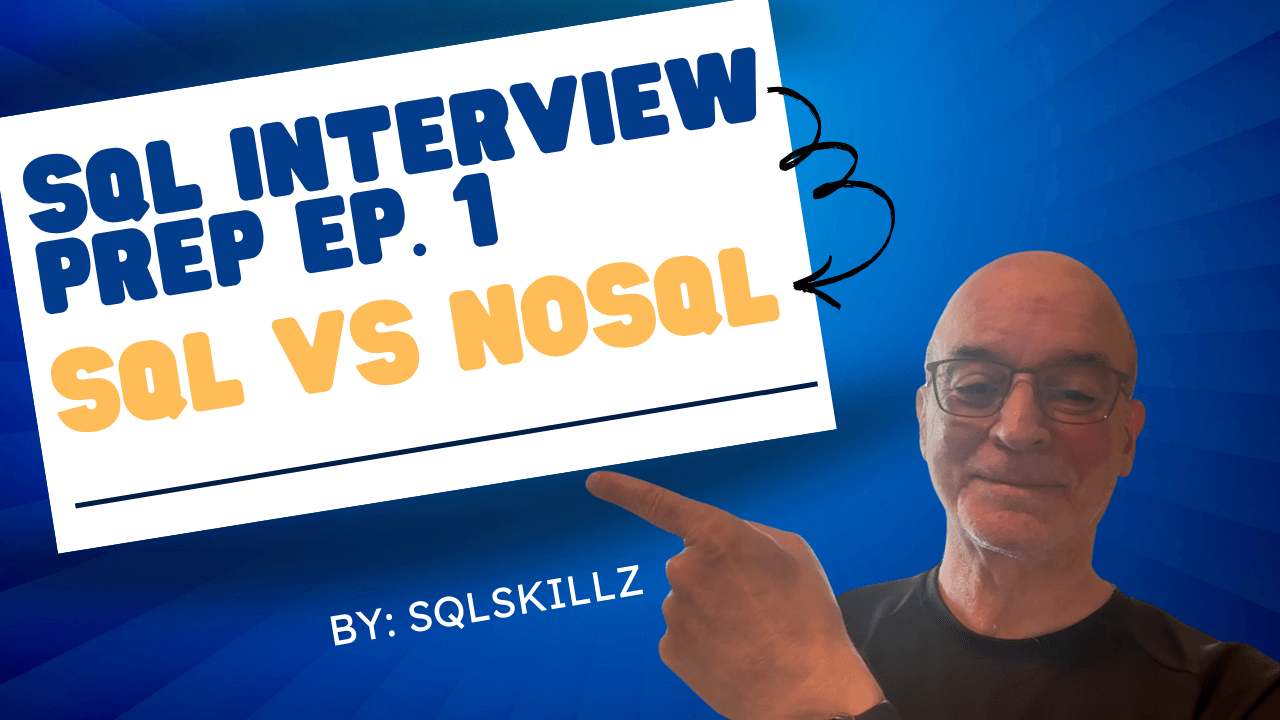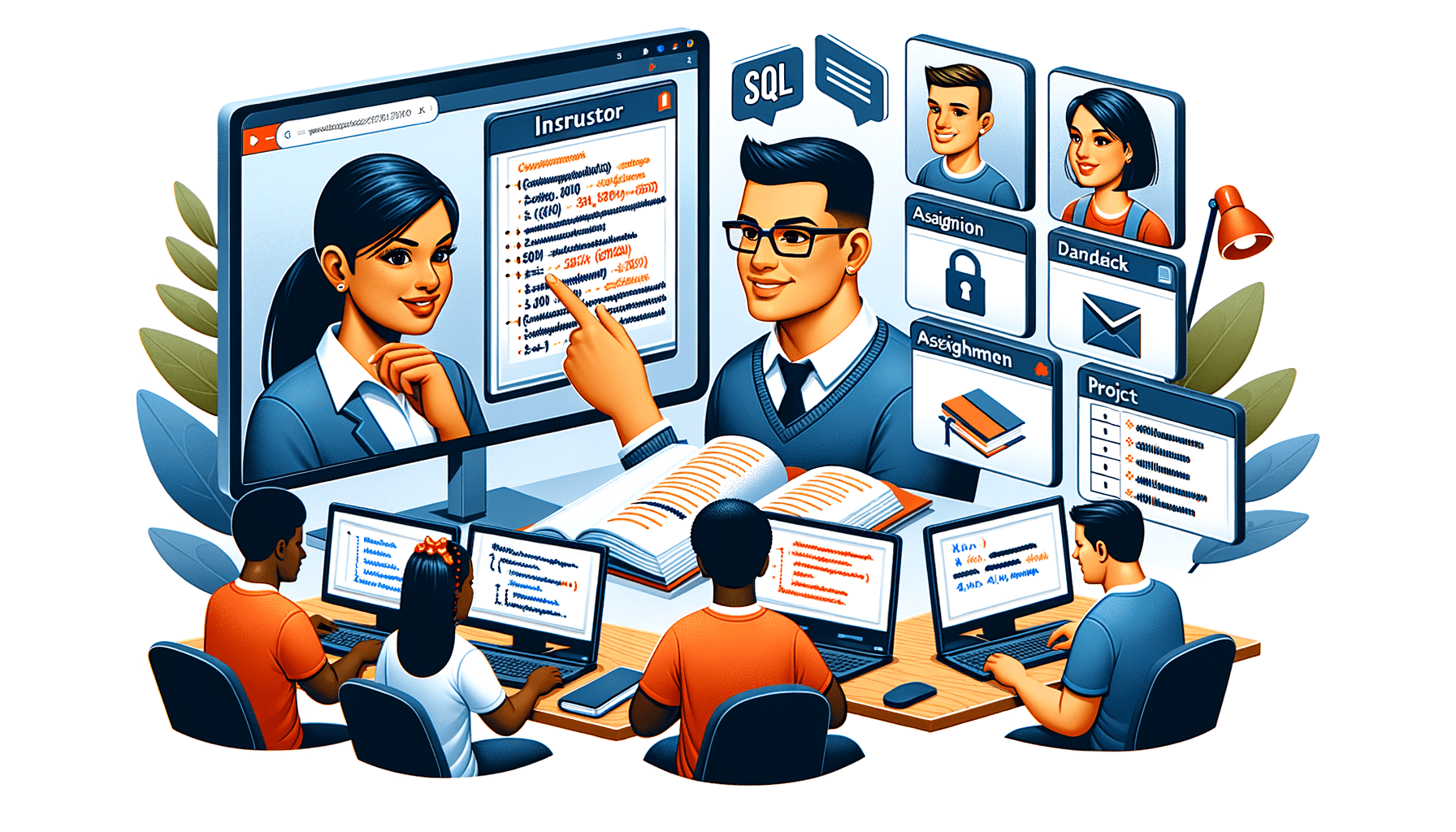A big variety of articles and resources

Can I start career as SQL devloper at age of 35 as single?
 Sia Author and Instructor
Learn SQL
Sia Author and Instructor
Learn SQL
13 minute read
Thinking about starting a new career as an SQL developer at 35 and being single? It's normal to wonder if it's too late. The good news is that it's possible. This article will explore the job market, educational paths, necessary skills, and the challenges and opportunities for older career changers. We'll also look at work-life balance, financial impacts, job search strategies, and the importance of mentorship. Finally, we'll peek into the future of SQL development.
Key Takeaways
- Starting a career in SQL development at 35 is possible with the right education and skills.
- Age can bring valuable experience and a unique perspective to the tech industry.
- There are many educational options, from degrees to bootcamps, to learn SQL.
- Networking and mentorship can play a big role in your career change success.
- Work-life balance and financial planning are important factors to consider.
The Viability of Starting a Career in SQL Development at 35
Understanding the Job Market for SQL Developers
The job market for SQL developers is robust and growing. Many industries, from finance to healthcare, need skilled SQL developers to manage and analyze their data. This demand creates numerous opportunities for new entrants, regardless of age.
Age and Career Transitions: A Statistical Overview
Statistics show that career changes are common, even later in life. Many people successfully transition to new fields in their 30s, 40s, and beyond. Age can bring valuable experience and a fresh perspective to a new career.
The Demand for SQL Skills in Various Industries
SQL skills are in high demand across various sectors. Industries such as technology, finance, healthcare, and retail all require professionals who can manage and interpret data. This widespread need ensures that SQL developers have a broad range of job opportunities.
Educational Pathways for Aspiring SQL Developers
As we explore the educational pathways available for those looking to become SQL developers, we find that there are several routes we can take. Formal education often provides a strong foundation, but it is not the only option. Many of us may consider pursuing degrees or certifications that focus on database management and SQL skills.
In addition to traditional education, self-learning resources and online courses have become increasingly popular. These platforms allow us to learn at our own pace and often cover practical skills that are directly applicable to real-world scenarios. For instance, we can enroll in courses like the zero to PostgreSQL junior DBA program, which offers hands-on projects and expert-led training. This course emphasizes the effort required for success and is taught by an instructor with over 25 years of experience.
Another option is to attend bootcamps and intensive training programs. These programs are designed to quickly equip us with the necessary skills to enter the job market. They often focus on practical applications and can be a great way to network with industry professionals.
To summarize, here are the main educational pathways we can consider:
- Formal Education: Degrees and certifications in computer science or related fields.
- Self-Learning: Online courses and resources that allow for flexible learning.
- Bootcamps: Intensive programs that provide hands-on training in a short time frame.
In the end, the path we choose will depend on our personal circumstances, learning style, and career goals.
By understanding these options, we can make informed decisions about how to best prepare ourselves for a successful career in SQL development.
Skills and Competencies Required for SQL Development
Technical Skills: SQL, Database Management, and More
To excel as an SQL developer, one must master several technical skills. Proficiency in SQL is essential, as it forms the backbone of database management. Additionally, understanding database design, normalization, and indexing can significantly enhance performance. Familiarity with various database management systems (DBMS) like MySQL, PostgreSQL, and SQL Server is also crucial. Moreover, knowledge of scripting languages such as Python or R can be beneficial for data manipulation and analysis.
Soft Skills: Communication, Problem-Solving, and Teamwork
While technical skills are vital, soft skills should not be overlooked. Effective communication is necessary for collaborating with team members and stakeholders. Problem-solving abilities are crucial for troubleshooting and optimizing queries. Teamwork is also essential, as SQL developers often work in groups to achieve common goals. Developing these soft skills can make a significant difference in one's career.
Continuous Learning and Professional Development
The tech industry is ever-evolving, and staying updated with the latest trends and technologies is imperative. Engaging in continuous learning through online courses, workshops, and certifications can keep one's skills sharp. Platforms like sqlskillz.com and udemy.com offer various courses for learning SQL basics. Participating in professional development activities can also open doors to new opportunities and career advancement.
In the fast-paced world of technology, continuous learning is not just an option but a necessity. Staying updated with the latest advancements can set you apart from the competition and pave the way for a successful career in SQL development.
Challenges and Opportunities for Older Career Changers
Overcoming Age-Related Stereotypes
Starting a new career at 35 can be daunting, especially with age-related stereotypes. We must challenge these stereotypes by showcasing our skills and experience. Age can be an asset, bringing maturity and a different perspective to the table.
Leveraging Previous Work Experience
Our past work experience is valuable. We can use the skills we've gained in previous jobs to excel in SQL development. For example, problem-solving and project management skills are highly transferable.
Networking and Building Professional Relationships
Building a network is crucial. We should attend industry events, join online forums, and connect with professionals on LinkedIn. These relationships can lead to job opportunities and valuable advice.
Embracing a career change at 35 is not just about learning new skills; it's about leveraging our existing strengths and building new connections. This journey can be both challenging and rewarding.
Work-Life Balance Considerations for Single Professionals
Managing Time and Stress
Balancing work and personal life can be challenging, especially when starting a new career. We need to set clear boundaries between work hours and personal time. Effective time management is crucial to avoid burnout. Simple techniques like prioritizing tasks and taking regular breaks can make a big difference.
Remote Work and Flexible Schedules
One of the perks of being an SQL developer is the possibility of remote work. This flexibility allows us to create a schedule that fits our lifestyle. Working from home can save commuting time and offer a more comfortable work environment. However, it's important to stay disciplined and maintain a routine.
Support Systems and Social Networks
Having a strong support system is essential. Friends, family, and professional networks can provide emotional support and practical advice. Joining online communities or local meetups can help us connect with others in the same field. Building relationships with peers can lead to new opportunities and collaborations.
Balancing a new career with personal life requires planning and support. By managing our time well and leveraging flexible work options, we can achieve a healthy work-life balance.
Financial Implications of a Mid-Life Career Change
Cost of Education and Training
Starting a new career often means investing in education and training. For those looking to become SQL developers, this could include enrolling in a zero to MySQL junior DBA course. These courses offer practical SQL training with real-world problem-solving. While the cost can vary, it's important to budget for these expenses.
Salary Expectations for SQL Developers
One of the key factors to consider is the potential salary. SQL developers can expect competitive salaries, but these can vary based on location, experience, and industry. It's crucial to research and understand what you can expect to earn in your area.
Long-Term Financial Planning
Switching careers at 35 also means thinking about long-term financial planning. This includes considering how the new career will impact your retirement savings and overall financial goals. It's wise to consult with a financial advisor to ensure you're on the right track.
Making a mid-life career change is a significant decision that requires careful financial planning. By understanding the costs and potential earnings, you can make an informed choice that aligns with your long-term goals.
Job Search Strategies for SQL Developer Positions
Crafting an Effective Resume and Cover Letter
When crafting a resume and cover letter, it's crucial to highlight your SQL skills and any relevant experience. Tailor your resume to each job application, emphasizing the skills and experiences that match the job description. Use clear and concise language, and don't forget to include any certifications or courses you've completed.
Utilizing Job Boards and Recruitment Agencies
Job boards and recruitment agencies can be valuable resources in your job search. Websites like LinkedIn, Indeed, and Glassdoor often have listings for SQL developer positions. Recruitment agencies can also help match you with potential employers. Make sure to keep your profiles updated and actively engage with job postings.
Preparing for Technical Interviews
Technical interviews can be challenging, but with the right preparation, you can succeed. Practice common SQL queries and database management tasks. Consider taking a course or using online resources to brush up on your skills. During the interview, be prepared to explain your thought process and how you approach problem-solving.
Remember, the job search process can be lengthy, but persistence and preparation will pay off in the end. Stay positive and keep honing your skills.
Success Stories and Case Studies
Profiles of Successful Mid-Life Career Changers
Many people have successfully transitioned to a career in SQL development later in life. One key example is Jane, who started her journey at 35. She took a mini course on SQL query crafting, which helped her learn SQL queries for data analysis and report generation. This practical training, combined with AI assistance, allowed her to apply her new skills in real-world applications.
Lessons Learned from Real-World Experiences
From these stories, we learn that persistence and continuous learning are crucial. Many mid-life career changers emphasize the importance of practical exercises and expert-led training. These elements help bridge the gap between theoretical knowledge and real-world application.
Advice from Industry Professionals
Industry professionals often advise newcomers to focus on building a strong foundation in SQL and database management. They also recommend leveraging previous work experience to add value to your new role. Networking and building professional relationships can also play a significant role in your career transition.
Transitioning to a new career at 35 is challenging but achievable with the right mindset and resources. Practical training and continuous learning are key to success.
The Role of Mentorship in Career Transition
Mentorship plays a crucial role in our journey as we transition into a new career, especially in fields like SQL development. Having a mentor can significantly enhance our learning experience and provide us with valuable insights that we might not find in textbooks or online courses. Mentors can guide us through the complexities of the industry, helping us to develop technical skills and navigate the job market effectively.
Here are some key benefits of having a mentor:
- Personalized Guidance: Mentors can tailor their advice based on our individual strengths and weaknesses.
- Networking Opportunities: They often introduce us to their professional network, which can lead to job opportunities.
- Real-World Experience: Mentors share their experiences, helping us to avoid common pitfalls and make informed decisions.
In our quest for mentorship, we should consider the following steps:
- Identify potential mentors in the SQL field.
- Reach out with a clear purpose and express our interest in learning.
- Build a relationship based on mutual respect and shared goals.
Mentorship is not just about receiving advice; it’s about building a relationship that fosters growth and development.
In conclusion, finding a mentor can be a game-changer in our career transition. By leveraging their experience and insights, we can enhance our skills and increase our chances of success in the SQL development field. As we embark on this journey, let’s remember that mentorship is a two-way street, where both parties can learn and grow together. Join for exclusive SQL news content and connect with experts like Eric and Sia to further enrich our learning experience.
Future Trends in SQL Development
As we look ahead, the field of SQL development is set to undergo significant changes. Emerging technologies are playing a crucial role in shaping the future of database management. From cloud computing to big data analytics, these advancements are transforming how we store, manage, and analyze data.
The evolution of database management systems is another key trend. Traditional relational databases are being complemented by NoSQL databases, offering more flexibility and scalability. This shift is particularly important for handling large volumes of unstructured data, which is becoming increasingly common in today's digital world.
Career growth and advancement opportunities in SQL development are also expanding. With the rising demand for data-driven decision-making, SQL developers are finding more opportunities across various industries. Whether it's in healthcare, finance, or retail, the need for skilled SQL developers is on the rise.
As we navigate these changes, it's essential to stay updated with the latest trends and continuously enhance our skills. This proactive approach will ensure we remain competitive in the ever-evolving field of SQL development.
The future of SQL development is bright, with new trends emerging that will shape the way we handle data. From advanced AI integration to more user-friendly interfaces, the landscape is evolving rapidly. Want to stay ahead of the curve? Visit our website to explore our courses and learn how you can become a SQL expert.
Conclusion
Starting a career as an SQL developer at the age of 35, especially as a single person, is not only possible but can be very rewarding. Age should not be seen as a barrier but rather as an asset, bringing maturity and life experience to the table. With dedication, continuous learning, and the right resources, anyone can succeed in this field. Remember, it's never too late to pursue your dreams and make a significant change in your career path. Stay focused, keep learning, and embrace the journey ahead.
Frequently Asked Questions
Is it too late to start a career in SQL development at 35?
No, it's not too late. Many people start new careers later in life and find success.
What kind of education do I need to become an SQL developer?
You can get a degree, take online courses, or join a bootcamp to learn SQL.
Are there jobs for SQL developers in different industries?
Yes, SQL developers are needed in many fields like finance, healthcare, and tech.
Do I need to know other programming languages?
Knowing other languages like Python or Java can help, but it's not always required.
How can I deal with age-related stereotypes when changing careers?
Focus on your skills and experience. Show employers what you bring to the table.
Is it possible to work remotely as an SQL developer?
Yes, many SQL developers work from home or have flexible schedules.
How much can I expect to earn as an SQL developer?
Salaries vary, but SQL developers often make good money. Research your area for specifics.
Can I find a mentor to help me transition to an SQL career?
Yes, finding a mentor can be very helpful. Look for someone experienced in the field.
Related Articles

Learn SQL vs NoSQL - SQL Interview Prep Ep. 1
4 minute read

Discover the Best Online SQL Course for Your Data Needs
9 minute read

Get Certified with Our SQL Online Course
8 minute read




